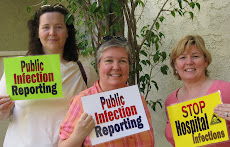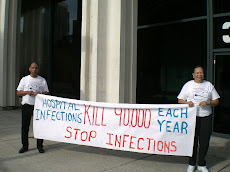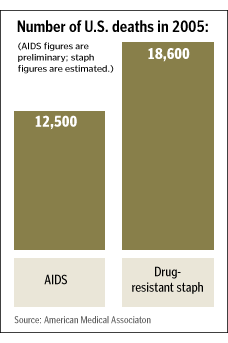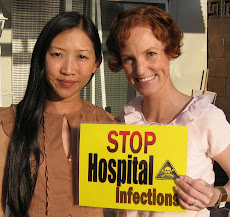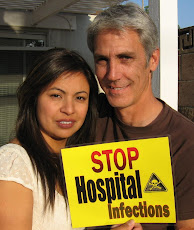
Not all physicians are well-qualified to practice medicine. And doctors who keep mum about their colleagues' incompetence have their own issues.
By Valerie Ulene, Special to the Los Angeles Times
August 2, 2010
Few doctors make it through their training without being involved in at least one case that goes awry. I was no exception.
As an intern, I was assisting in a routine hernia operation when the attending surgeon cut the vas deferens, the tube that transports sperm from the testicle. I expected to be grilled by my colleagues afterward on the details, pressed to explain how this largely avoidable mistake possibly could have been made. That didn't happen.
Everyone already suspected what had gone wrong and who was responsible — the attending surgeon was notorious for his careless surgical technique — and they were simply willing to let it pass.
The surgeon's technical error was the first of two mistakes made in this case. The surgeon's colleagues committed the second error post-operatively: They chose to overlook a pattern of seemingly suboptimal care.
As patients, we'd like to believe that every physician is well-qualified to practice medicine. It simply isn't so. Some doctors are impaired by substance abuse; others by medical conditions such as mental illness. And some simply lack the technical skills or knowledge to safely care for patients; they are, frankly, incompetent.
No one knows precisely how many such doctors are actively caring for patients. But, according to a study published in July in the Journal of the American Medical Assn., the numbers are likely substantial. Researchers at Massachusetts General Hospital surveyed thousands of physicians in a variety of medical specialties; 17% said they'd had direct, personal knowledge of an impaired or incompetent colleague in their hospital, group or practice in the last three years.
Weeding out physicians who threaten the quality of care is challenging. Hospitals must routinely undergo detailed reviews, but doctors are largely unmonitored. In large part, they are expected to police one another. "Physicians are really the first line of defense," says Catherine DesRoches, lead author of the JAMA study.
In many ways, this approach makes sense. After all, who better to judge the work of one professional than someone with the same training and skills? But without other methods of monitoring in place, many incompetent and impaired physicians are allowed to continue treating patients.
According to the American Medical Assn.'s Code of Ethics, individual physicians have an ethical responsibility to report colleagues who they suspect are unable to practice safely; in most states, including California, reporting is actually a legal requirement. Nevertheless, many doctors fail to follow through on concerns about fellow physicians. In the JAMA study, 1 in 3 doctors who had reason to report chose not to do so.
"Whether that's a good number or a bad number depends on where you sit," DesRoches says.
Two-thirds of doctors are acting responsibly, but patients naturally want that number to reach 100%.
Patients are destined to be disappointed. Some doctors simply don't believe that reporting is always the right thing to do. In fact, only 64% of physicians surveyed in the JAMA study completely agreed that they have a professional commitment to report a colleague who may be endangering patients or not adequately performing his or her job. Further, many doctors don't feel prepared to assume the role of overseer. For some, it's an issue of logistics; they don't know whom to contact or how the process works. Others simply don't feel qualified to determine whether or not someone should be reported.
"Sometimes determining who's competent and who's incompetent is difficult," says Dr. Matthew Wynia, director of the AMA's Institute for Ethics.
Not only can incompetence levels vary, but someone can be competent at one thing and incompetent at another. Then there's the issue of clinical opinion: Doctors frequently approach the same problem in different ways. Just because two doctors don't agree on the best way to care for a patient doesn't mean that either of them is wrong.
Sometimes doctors opt not to report because they worry about the potential repercussions — for both themselves and the physicians they're turning in. They fear that reporting one colleague will damage their own personal and professional relationships. If they're viewed as a "snitch," for example, other physicians may stop referring patients to them or avoid collaborating with them lest they be deemed incompetent too. In the JAMA study, 12% of physicians who failed to report a problematic colleague made that choice because they feared retribution.
Doctors also worry that their colleagues will be punished excessively. Even the suggestion of a problem can irreparably damage a physician's reputation within the medical community. And, if a physician's license is revoked, his or her career is over.
"We need to recognize that doctors are human beings," Wynia says. Like anyone else, they have difficulty being the whistle-blower and have trouble turning in their friends.
"It's not the only method we should use to monitor professional behavior," says Wynia. "There are other mechanisms for quality assurance that are equally, if not more, important." For example, physicians should be required to pass rigorous recertification exams. "You should have to not only maintain your competence to practice over time, you should have to prove it."
There are plenty of details about my internship I can't remember; the hernia surgery, however, remains vividly clear. None of my colleagues wanted to hear what had happened in the operating room that day; it would have put them in the awkward situation of having to do something about it. Because the error had been corrected and the patient was doing fine, everyone could rationalize that it was a case of no harm, no foul.
I was distressed by the response but, being new on the job, figured it wasn't my place to accuse anyone of practicing bad medicine. I also thought that ultimately someone with more authority would address the problem. As far as I'm aware, nobody ever did.
Ulene is a board-certified specialist in preventive medicine practicing in Los Angeles. The M.D. appears once a month.
health@latimes.com
Copyright © 2010, The Los Angeles Times
